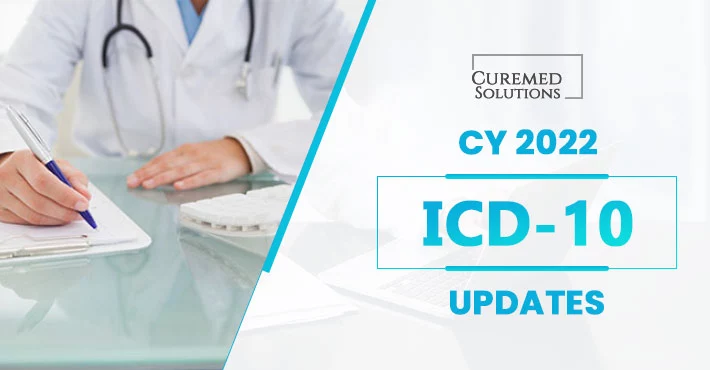ICD-10 Updates CY 2022
Highlights of FY 2022 ICD-10 Official Guidelines for Coding and Reporting
Every year on October 1, the Centers for Medicare and Medicaid Services (CMS) and the National Center for Health Statistics (NCHS) released updated ICD-10 Official Guidelines as well as changes to the code set. This year, there are about 211 coding changes constituting:
| New added codes |
Deleted codes |
Revised codes |
| 159 |
32 |
20 |
Coding updates have been made in chapters on musculoskeletal and connective tissue disorders, gastrointestinal and nervous systems, and also in the list of signs, symptoms, and laboratory findings.
There are a few important modifications to the coding guidelines that need to be highlighted. This blog focuses on these guidelines that are relevant for physicians, facilities, and organizations for accurate medical coding.
- Encounter Codes- U00-U85, codes for special purposes, can also be used to identify diagnoses, symptoms, conditions, problems, complaints, or other reason(s) for the encounter/visit.
- Documentation by Clinicians Other than the Patient's Provider- Documentation from clinicians who are permitted based on the regulatory or accreditation requirements or internal hospital policies to document in a patient’s official medical record may be used for codes for:
- Body Mass Index (BMI)
- Depth of non-pressure chronic ulcers
- Pressure ulcer stag
- Coma scale
- NIH stroke scale (NIHSS)
- Social determinants of health (SDOH)
- Laterality
- Blood alcohol level
- Laterality- If the provider does not document laterality, documentation from other clinicians may be used for determining laterality. The code for the “unspecified” side should rarely be used, and if there is conflicting documentation of the laterality in the record, then the attending provider should be queried.
- Neoplasms- Breast implant-associated anaplastic large cell lymphoma (BIA-ALCL) is a type of lymphoma that can develop around breast implants. Assign code C84.7A for this and not a complication code from chapter 19.
- Diabetes mellitus- If the patient is treated with both oral medications and insulin, both code Z79.4, Long term (current) use of insulin, and code Z79.84, Long term (current) use of oral hypoglycemic drugs, should be assigned. If the patient is treated with both insulin and an injectable non-insulin antidiabetic drug, assign codes Z79.4, Long term (current) use of insulin, and Z79.899, another long term (current) drug therapy.
- Medical Conditions Due to Psychoactive Substance Use, Abuse, and Dependence- Medical conditions due to substance use, abuse, and dependence are not classified as substance-induced disorders. Diagnosis code is assigned for the medical condition as directed by the Alphabetical Index along with the appropriate psychoactive substance use, abuse, or dependence code. For example, for alcoholic pancreatitis due to alcohol dependence, assign the appropriate code from subcategory K85.2, Alcohol-induced acute pancreatitis, and the appropriate code from subcategory F10.2, such as code F10.20, Alcohol dependence, uncomplicated. It would not be appropriate to assign code F10.288, Alcohol dependence with other alcohol-induced disorders.
- Injuries, Poisonings, and Certain Other Consequences of External Causes- This has the greatest expansion of codes this year with 45 being added to this chapter. Six codes are being added to describe traumatic brain compression with and without herniation (S06.A0XA-S06.A1XS), and 39 codes are being added to describe adverse effects, underdosing, and poisonings due to cannabis and synthetic cannabinoids (T40.711A-T40.716S and T40.721A-T40.726S). Two of the new codes in this chapter will be listed as MCCs: S06.A0XA (Traumatic brain compression without herniation, initial encounter) and S06.A1XA (Traumatic brain compression with herniation, initial encounter).
Changes have also been made in COVID-19 related ICD guidelines with the addition of newer codes. A lot of focus has been on social determinants of health with the addition of 13 new codes to the chapter ‘Factors Influencing Health Status and Contact with Health Services.
Precise coding is quintessential for appropriate billing and reimbursement. At Curemed Solutions, all our coders are updated on the latest CPT and ICD guidelines and codes to ensure accurate coding and maximized remuneration. In our upcoming blogs too, we will continue this trend of reviewing more key changes made to the ICD-10 and CPT codebook and other billing-related information relevant for healthcare providers and organizations.


